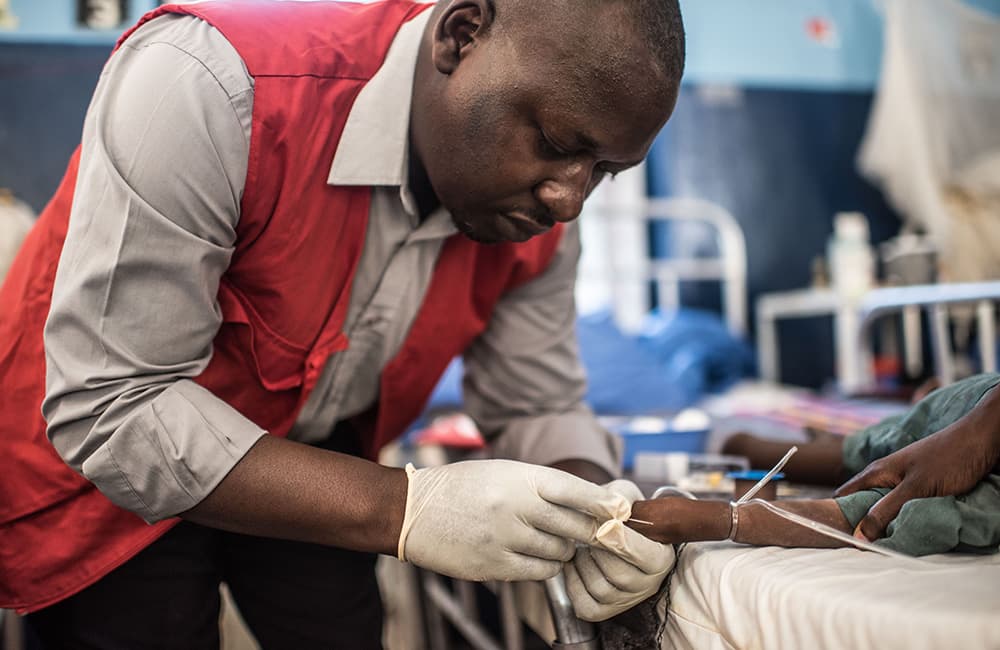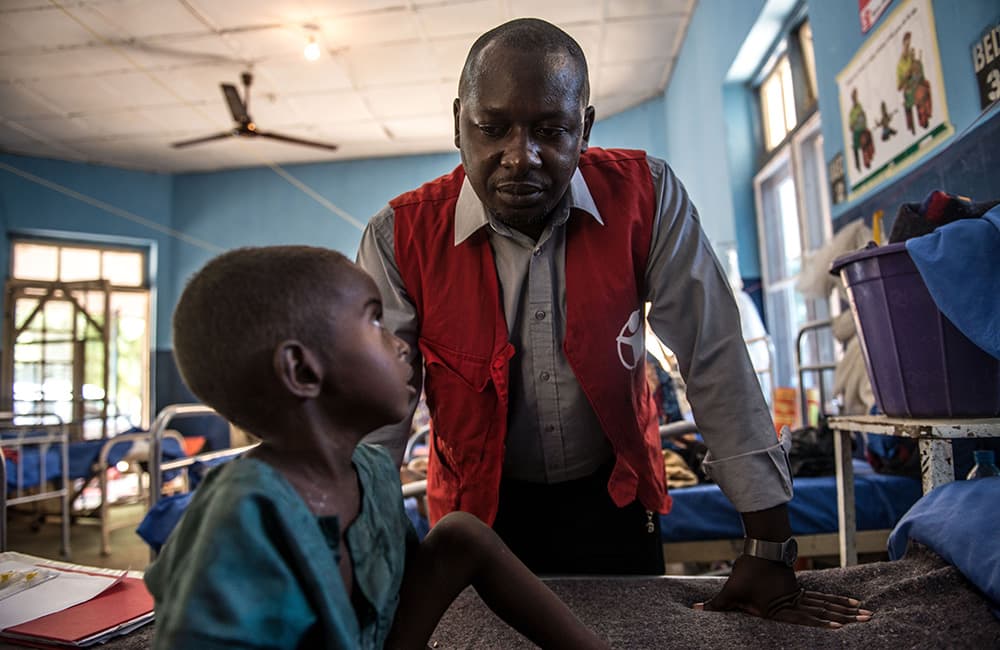A picture may tell a thousand words, but this one might deceive you.
Update, July 2017: South Sudan is no longer classified as being in famine. However, the situation remains critical and if support for children and families does not continue, some areas could easily slip back into famine. Children's lives are in danger, and they still need urgent support.
Believe it or not, Abdi* (pictured above) is one of the lucky ones. While little 15-month-old Abdi is fighting for his life in Garowe General Hospital in northern Somalia, he is, at least, receiving treatment.
For thousands of other children in more remotes areas of Somalia, there's no one to help. No hospital. No health professionals. No medicine. And – critically – no food.
The first victims of famine
Famine has been declared in South Sudan. Together with Somalia, Yemen and Nigeria, more than 1.4 million children are at imminent risk of starvation with these countries on the brink of famine. Kenya and Ethiopia are also facing critical food shortages. Experts say we're at a tipping point in this crisis.
Somalia is facing a new famine – and Save the Children is warning the situation could be worse than their 2011 famine that claimed 260,000 lives.
Experts predict the number of children suffering from malnutrition in Somalia could rise to 850,000 cases this year unless urgent aid is provided to the severely drought-stricken country. The United Nations has warned that more than 50,000 children are now facing death in Somalia.
Nigeria in crisis
In north-eastern Nigeria, West Africa, two-year-old Shuri* and his seven-year-old sister Rukaiya* are also fighting for their lives.
 Photograph: Tommy Trenchard/Save the Children
Photograph: Tommy Trenchard/Save the Children
Dr Bot Isaac examines two-year-old Shuri at Save the Children's health centre in Maiduguri, Nigeria. Shuri's mother, Zuwaira, watches over him. Their family was displaced by the conflict in 2014 and now survives on just 100 Naira (42 Australian cents) per day.
"With Rukaiya, it started with malaria. When there is no food, the slightest sickness becomes so much more serious," says their mother, 35-year-old Zuwaira. "One of the community volunteers saw my children and told us to go to the nutrition clinic. Then they brought us here [to Save the Children's health centre].
"Rukaiya was almost dead and ready to be buried. She couldn't stand or recognise anyone. She was just crying. She couldn't even talk."
Rukaiya is getting stronger, thanks to help from Save the Children's health clinic.
"I don't know where the sickness would have ended. But when I got here [to the health clinic] I felt less worried. I saw other children getting better," says her mother.
Thankfully, after treatment from Save the Children's doctors and health workers, Rukaiya is recovering. "She can now talk. Now she is starting to look better," says her mother.
And her little brother is also getting stronger.
"Shuri could not sit up and his temperature was high all the time. Now [that he's getting treatment] he is slowly getting better."
Just after he was born, Shuri's family fled their home after their village was attacked. They tried to return last year after the elections, only for it to be attacked again and burnt down. Now, their only income is what Shuri's father can make carrying water for people from the borehole.

Photograph: Tommy Trenchard/Save the Children
Dr Bot helps many children like Shuri at Save the Children's health centre in Morlai General Hospital in Maiduguri, Nigeria.
Children are paying the heaviest price for seven years of insurgency and violence in Nigeria. According to the United Nations, 450,000 children in Nigeria are at risk of severe malnutrition in 2017, 90,000 of whom could die.
Widespread famine looms
And it isn't just Somalia and Nigeria's children who are fighting starvation. Famine has now been declared in parts of conflict-crippled South Sudan and the United Nations has warned that, along with Somalia and Nigeria, Yemen is also on the brink of catastrophe. Meanwhile, Kenya and Ethiopia are facing crippling droughts.
In 2010–2011, 258,000 people lost their lives in Somalia because of drought. We cannot let this happen again.
I want to help. What can I do?
You can support our Child Hunger Crisis Appeal. Everything we raise will help us get urgent support to children and families in South Sudan, Somalia, Yemen, Nigeria, Kenya and Ethiopia.
We are already reaching the hardest-hit communities. Right now, our teams are on the ground delivering life-saving aid:
- We are providing food aid and cash transfers so children can eat.
- Our Emergency Health Unit teams are treating children suffering from severe malnutrition.
- We are getting clean drinking water to hard-to-reach communities.
- We are providing technical assistance to governments to support their responses.
Please donate today to
help children who need you most.
Header Image: Tom Pilston/Save the Children
*Names changed to protect their identity.